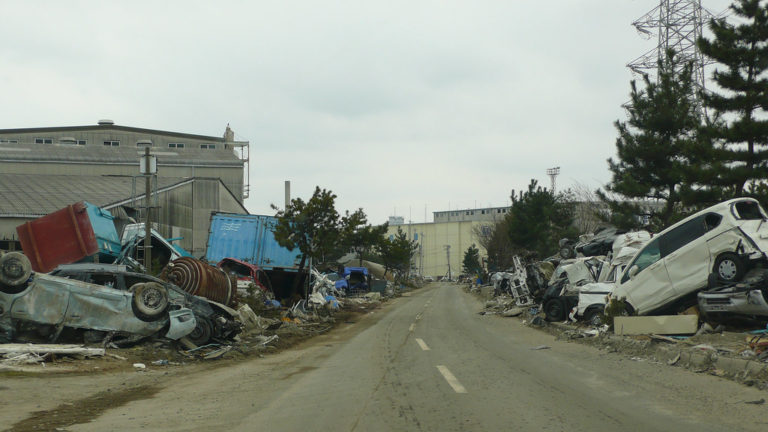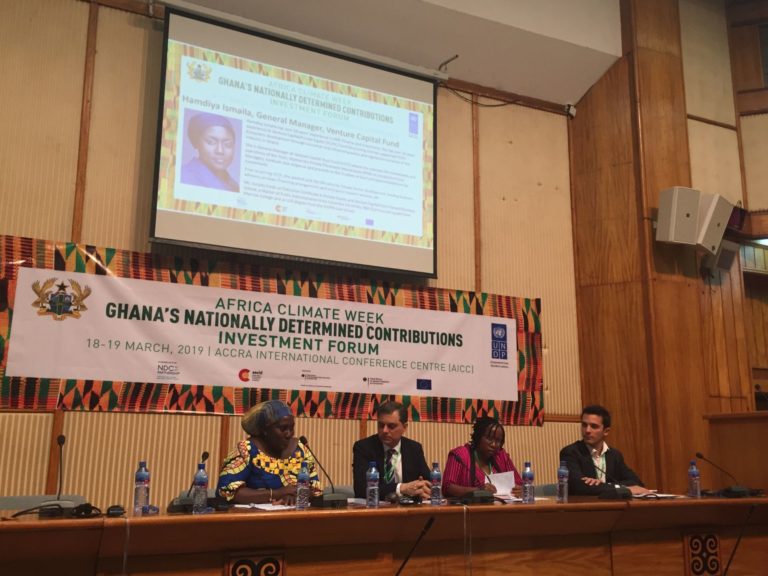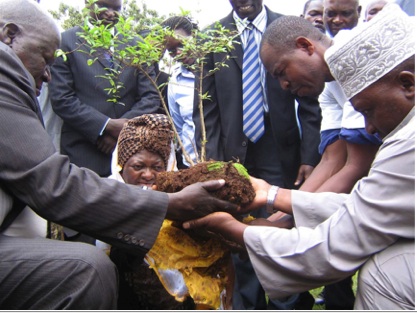Climate change is the single greatest challenge humanity has ever faced, threatening water and food security, health and livelihoods. But climate change has also been called the ‘greatest investment opportunity in history, with an estimated value of around 10 percent of global GDP. It is believed that bold climate action could trigger USD 26 trillion in economic benefits by 2030 and create around over 65 million new jobs.
It is estimated that the private sector will have to shoulder some 85 to 90 percent of the investments needed to transform our economies to zero carbon by 2050, one of the targets outlined in the Paris Agreement. But these investments are currently not flowing at the pace or scale needed to bend the emissions curve.

It is widely acknowledged that the 100 billion USD per year financing commitment from the public sector must be strategically used to leverage and de-risk private investment and increase climate action on the ground. The current finance flows are far from sufficient and it’s critical to get investors and policy makers together.
Ghana has demonstrated strong political will in raising the ambition of its climate agenda, as showcased by the NDC Implementation and Investment Plan, the Coordinated Programme of Economic and Social Development Policies 2017–2024 (CPESDP), as well as the Ghana Sustainable Development Goals Indicator Baseline Report led by the President of the Republic of Ghana as Co-Chair of the Eminent Group of Sustainable Development Goals. To combat climate change, Ghana is also promoting the use of renewable energy and low carbon electricity generation, clean cooking stoves, reducing deforestation, building the resilience of farmers, and investing in sustainable infrastructure.
Ghana is a regional champion in engaging the private sector in its approach to climate change, and UNDP has been working with the government to support these efforts. Currently, The Ministry of Environment and the Environmental Protection Agency of Ghana are working with a team of experts from public and private sector on the development of standardized low carbon products that can be aggregated and structured to attract investors. The training programme was set up as an in-country climate finance incubation hub to offer learning-by-doing opportunities on how to transform projects into a “market-ready product”.
The two-day Ghana’s Nationally Determined Contribution (NDC) Investment Forum – organized by UNDP Ghana and the Ministry of Environment, under the NDC Support Programme, took place on the 18th and 19th March to catalyse private sector investment and to garner financial, as well as policy support from all relevant stakeholders, in the process of moving towards implementation of Ghana’s NDC submitted in the context of the Paris Agreement. The Investment Forum showcased proven policy, technology and finance solutions to attract private investment, presented investment-ready climate NDC projects, and introduced entry points for private sector to engage in NDC actions. Also, as one of the pioneering countries on Cooperative Approaches under Article 6 of the Paris Agreement, Ghana officially announced the Ghana-Switzerland cooperative approach for Internationally Transferred Mitigation Outcomes (ITMO) to scale-up Ghana’s Transitional National Clean Energy Access Program.

During the NDC Investment Forum, it was highlighted that increasing the levels of ambition in NDCs will require increasing the levels of investment and enhancing the supporting systems to accelerate the low-carbon transition. However, how can investments be accelerated in the right places? There is ample evidence that well considered policy decisions will lead to a low carbon transition. Implementation of the SDGs presents investment opportunities with the right enabling environment and strong political will. There is the need to mobilize resources through the collaboration of government, development partners and the private sector to consistently implement their NDCs. Engaging private sector means focusing on de-risking. Funds can take a catalytic approach. Governments resort to guarantee funds to reduce risk. Linking financial returns to outcomes will help investors directly see the outcome of their investment. Promoting private sector engagement involves low interest for the private sector, tax incentives for investors in the climate sector, expansion of risk sharing instruments through guarantee insurance, innovation grants and national Green Banks to focus exclusively on green business.
Climate change and environment are perceived by the government as a way to leverage technology to transform the economy. Ensuring that growth is not at the expense of the environment requires a framework for green technology. The NDC also gives the opportunity for young people to be innovative and active researchers and participants in the economy towards delivering sustainable and green solutions. However, large private sector investment requires investor confidence and a good understanding of the macro-economic environment and how policy and financial de-risking measures can increase such confidence. Key macroeconomic policies are being pursued to drive investment and promote growth as well as create the necessary environment to implement the NDCs. Ghana’s macroeconomic conditions have been stabilised to ensure accelerated growth. These include inflation and interest. There is a much-strengthened financial sector which is conducive to investments into the NDCs and together with macroeconomic indicators and ongoing efforts, have placed Ghana in a much better position for business.
Short and medium-term opportunities to increase ambition have to involve an increasingly engaged private sector through targeted incentives for the private sector, expansion of risk sharing instruments through guarantee insurance, innovation grants and national Green Banks to focus exclusively on green business. Private sector and civil society are considered by the Government of Ghana as key non-Party stakeholders and are part of the transition of the economy towards a low carbon and climate resilient economy through growing awareness and concrete and growing economic opportunities.

However, also other African countries have started to strategically engage private sector for the financing of NDCs. In Uganda for example, the Ministry of Water and Environment of Uganda, in collaboration with UNDP and GGGI is currently developing a national financing vehicle which shall build institutional capacity to further the national ownership of climate action funding. It will be structured in such a way as to be able to apply flexible financing mechanisms to projects according to Ugandan needs and prioritization and attract funding from multiple sources, including priate sector. Private sector will be catalyzed from identifying project pipeline themes and their funding needs and then tailoring instruments to best address them. This will give further indication as to the best fund model to reach the widest number of NDC actions. Ongoing work in Uganda is also looking at business opportunities and partnerships with private sector to increase investments in mitigation actions. This includes the development of a reporting framework for private sector to contribute to Uganda’s NDC. The reporting framework will guide the private sector to assess their contributions to climate change and SDGs as well as analyze measures where private sector can improve their business operations and models to adopt to low carbon technologies.
Editor’s Picks – Related Articles:
“Green New Dealers: What Next?”
“Beyond financing: getting private sector support for sustainable development right”
In Kenya, private sector is considered particularly vulnerable to climate change risks and has identified climate change as a threat to economic growth, domestic and foreign investment, and private sector productivity and competitiveness. On the other hand, the Government of Kenya sees the particular competencies of the private sector that can make a unique contribution to low carbon climate resilient development path and the implementation of the National Climate Change Action Plan (NCCAP)[13]. Implementing the NCCAP critically depends on the support and action of the private sector. This will require effective engagement between the private sector and government to eliminate barriers to action, encourage and incentivize private sector in adaptation and mitigation. In addition, the private sector requires clear communication of the key climate change messages to inform planning and actions. For this reason, The Ministry of Environment and Forestry, together with UNDP, is currently developing a private sector engagement and coordination framework for the quick and effective implementation of the NCCAP.

In Nigeria, the Federal Ministry of Environment is now exploring the application of a green bond, designed specifically to enable the private sector to contribute to implementation of the Paris Agreement in the area of climate finance. The envisaged bond structure will offer a financial incentive to private sector to encourage NDC actions through refinancing of loans via the domestic and international bond markets. Such a bond structure would mean to allow Nigerian banks to become more active in project finance for green infrastructure with long tenors (i.e. greater than five years), which may help to overcome significant limitations faced by Nigerian banks to date which rely on NGN-denominated deposits for a large component of their funding.
Last but not least, South Africa, is rolling out a renewable energy initiative with private sector in the lead. Regulatory support through open grid access for privately owned power plants and Initial low-cost financing provided by development finance institutions will leverage the remaining commercial finance needed to achieve the ambitious investment target of US$ 35.6 billion by 2030.
There is huge momentum for sustainable investment and economic development across Africa with an unparalleled opportunity today to leapfrog into a low-carbon society to safeguard the natural and cultural beauty which are unique to the continent.
Contributed by Woojoo Kim
 Woojoo Kim specializes in climate change policy and sustainable development with extensive professional background from climate change adaptation and capacity building to mitigation and carbon finance, and with proven experience in business development and stakeholder engagement.
Woojoo Kim specializes in climate change policy and sustainable development with extensive professional background from climate change adaptation and capacity building to mitigation and carbon finance, and with proven experience in business development and stakeholder engagement.
She is a pianist by passion and a coach supporting women and youth across the world.
Editors Note: The opinions expressed here by Impakter.com columnists are their own, not those of Impakter.com. — In the Featured Photo: Seashore in Ghana by Jared Poledna on Unsplash













